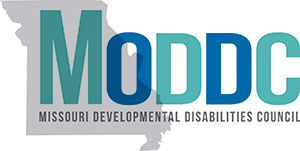Missouri Developmental Disabilities Council's Position Transition to Adulthood
Students with disabilities deserve the same opportunities as everyone else when they finish school. They should be able to keep learning, get a job, and live on their own. They deserve to be a part of their community and live good lives. Transition services can help people with disabilities do these things.
Students should be in charge of setting the goals they want. Schools should work with them and their families. Schools should help students learn skills to meet their goals as an adult. State agencies, like service providers, should help students learn about their choices once they finish school. Everyone has to work together to make sure students with disabilities live good lives after school.
Why are transition services important?
Schools must give transition services to students who get inclusive education services.
Transition services help students learn the skills they will need. Transition services usually start the year a student turns 16. They may start earlier depending on the student.
Students who get transition services, get a transition plan. Transition plans should be unique for each student. Two students should never have the same plan. Transition plans should focus on each student’s strengths, preferences, and interests.
Some goals that transition plans help students get ready for are:
- To keep learning after high school
- Getting training for a career
- Getting good jobs
- Learning about services they can use as adults
- Living on their own
- Being a part of their communities
Students with disabilities usually get services through many different groups. Transition services help students the most when schools work together with all these groups. When different groups work together to help a disabled person, it’s called coordinated support. Coordinated support gives disabled students a better chance at living a good life. They are more likely to finish school, get jobs, and live on their own.
Unfortunately, schools don’t always do a good job with transition services. Nearly half of Hispanic/Latinx students said their transition services weren’t doing enough. 1 in 10 students didn’t get any help with their goals for after graduation. More than 1 in 3 students weren’t working or going to college after finishing school. Many parents said schools told them to put their kids in guardianships. They said they weren’t told about any other options, or about how guardianships can hurt people.
What should Missouri do?
Schools should start transition services as soon as possible. They should give students many good choices about what to do after school. They should focus on learning and finding a good career. And they should give students the skills they need to live on their own.
Students should be in charge of their transition plans. Every student has their own strengths, preferences, and interests. Every student’s transition plan should be written just for them.
Schools need to make sure students have a support network before they leave school. This network should be people, groups, and services that can help them.
The state agency in charge of schools in Missouri is called MO DESE. MO DESE should make sure that other services providers work together on transition services. Some of these service providers are:
- Vocational Rehabilitation
- Department of Mental Health
- Centers for Independent Living
- Medicaid Waiver providers
- Other organizations that help with work, learning, and housing
Schools should help find opportunities for their students to work at good jobs. They should get to know local businesses and work together.
A sheltered workshop is a business where only people with disabilities work. These businesses can sometimes pay people with disabilities less than minimum wage. MO DESE should make guidelines about how often schools send students to sheltered workshops. MO DESE should tell the public about how schools are doing. MO DESE should do something about schools that send too many students to sheltered workshops.
Schools should not tell parents to get guardianship of their children with disabilities. They should help parents find the right ways to support their child. Schools should help students with disabilities learn the skills they need for adulthood.

